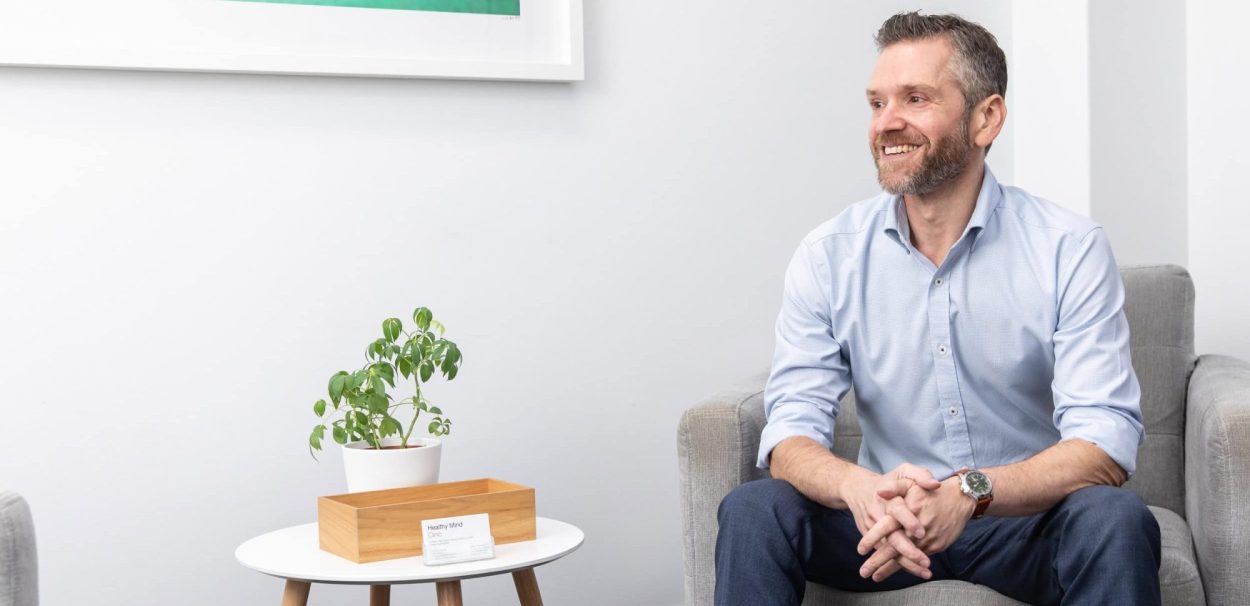It’s common to experience occasional times of sad mood or lower energy. They may occur during normal but unfortunate life circumstances such as the death of someone close, job loss or the end of a relationship. However, if the feelings of sadness persist and stop you from pursuing or enjoying your usual activities, they may be a sign of depression. If you’re having difficulty with persistent low mood, our clinical psychologists in Sydney are here to help you. We have expertise in assessing, diagnosing and helping people in the treatment of depression and other mood difficulties.

Depression Treatment Sydney
What is Depression?
Depression (or Major Depressive Disorder) is different from occasional sad mood. In depression, people feel low, sad mood much of the time for at least two weeks. This is accompanied by other symptoms, such as difficulty enjoying usually enjoyable activities, sleeping much more or much less than usual, low energy, teariness, difficulty concentrating, withdrawing from other people, low self-esteem and suicidal thoughts. Some people with depression may experience all or only some of these symptoms. The low mood in depression is often more severe and prolonged than in usual mood fluctuation. Depression is a serious mental health condition that severely impacts on a person’s quality of life. It can impact relationships, work and physical health. It also increases risk of suicide and physical health conditions. The good news is that helpful effective treatment for depression is available.
Depression in Australia is common. The most recent National Survey of Mental Health and Wellbeing showed that 15% of Australian adults experience a mood disorder. Depression affects more than 264 million people globally and is a leading cause of global burden of disease. So you’re not alone if you’re affected by depression.
Signs and Symptoms of Depression

There are common changes to how we think, feel and behave in depression. Thinking in depression tends to become more negative, particularly in how people think about themselves, their future and their problems. Here are some examples of changes in each of these areas:
Thoughts:
- I’m useless
- Nothing will work out
- Things won’t improve
- I’ll never get better
- There’s nothing I can do
- What’s the point?
- I’m a burden
- Thoughts of ending your life (If you have immediate concerns for your safety or are in crisis, please call Lifeline on 13 11 14, call Emergency 000, or go to your nearest hospital emergency department).
Bodily and emotional feelings:
- Much lower energy
- Sleeping much more or less than usual, or disrupted sleep
- Much greater or lesser appetite
- Unintentional weight change
- Low motivation
- Difficulty enjoying or being interested in things that would usually be interesting or enjoyable
- Difficulty concentrating
- Irritability
- Restlessness
- Feeling anxious
Behaviour
- Teariness or crying
- Staying in bed much longer than usual
- Withdrawing or isolating from people e.g. not contacting or responding to contact from friends
- Doing much less of your usual activities
- Cancelling plans when you usually wouldn’t
Types of Depression
There are different types of depression. Most of the information on this page refers to Major Depressive Disorder (MDD). Another type of depression is called Persistent Depressive Disorder (or dysthymia). This is a type of depression that lasts for 2 years or more, but may have less symptoms than MDD. Depressive episodes also occur in Bipolar Disorder. This is a disorder made of both depressive episodes and episodes of mania. An episode of mania is a period of significantly elevated euphoric mood that last for several days. During these periods, people may also experience feeling much more energised than usual, much less need for sleep, feel very driven or more productive than usual, distractibility, urges to take physical or sexual risks. People may sometimes also have ideas they wouldn’t usually believe or feel like they’re experiencing unusual things.
Causes of Depression
Various factors influence whether someone develops depression. Genetics is one – people are more likely to develop depression if an immediate family member has had depression. Stressful life events in early childhood may make people more likely to experience depression in adulthood. Depression may also follow experience stressful life events. Having an anxiety disorder or a generally anxious or negative temperament may also contribute to developing depression.
Treatment of Depression
Common treatments for depression include “talk-based” therapies and medication. One of the most widely studied and scientifically supported talk therapies for depression is cognitive behavioural therapy (CBT). This involves regular meetings with a professional, such as a clinical psychologist, to learn skills to better handle particular patterns of thinking and behaviour that occur in depression to help people improve how they feel. It also includes practicing skills in between meetings, similar to seeing a personal trainer. Complementing this with mindfulness-based skills can also be helpful. Some people find medication helpful for managing depression. You should speak to your doctor about medication. Recent research evidence suggests that some people find combining medication with talk therapy (like CBT) can be more helpful than using just one of these approaches alone. (This information is based on the current treatment guidelines for mood disorders available here.)
Our Services
Our Sydney-based clinical psychologists have expertise in treating depression and related concerns with cognitive behavioural therapy (CBT). We complement this with mindfulness-based and acceptance-based approaches where helpful. We provide treatment in a warm, empathic environment. When we first meet you, we aim to get a specific and detailed understanding of you as a person and of your concerns. We then work with you to develop an individual CBT-based treatment plan. We aim to work collaboratively throughout treatment to support you and teach you the skills you need to improve how you feel and to stay well.
Please contact us to arrange an appointment and to find out more about how we can help you. We look forward to working with you.
Enquire about an initial appointment
Our practise offers appointments on Mondays to Thursdays. Reception is available Monday to Friday. We offer some appointments outside usual business hours in order to be as accessible as possible. We will respond to you as soon as possible.
